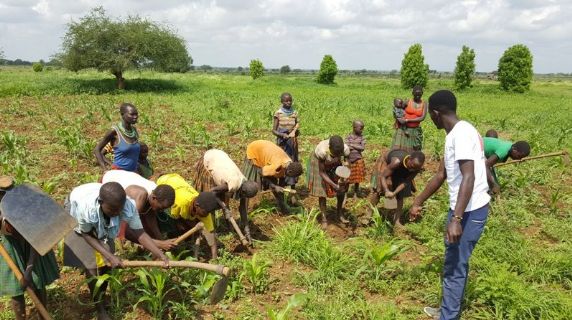
Agricultural – zootechnical
In the latest UN report on global food security "The State of Food Security and Nutrition in the World", published in 2020, it was estimated that in 2019 almost 690 million inhabitants of the planet suffered from hunger.
In percentage terms, as regards food insecurity, Africa is the region most affected and most destined to be so also in the future, with 19.1% of the population malnourished.
One of the key objectives of AMCS action in Uganda has always been since its foundation to support the most vulnerable populations and in contexts of marginalization, in addressing basic needs: the supply of sources of safe water, access to a healthy and nutritious food, access to basic education. The AMCS intervention continues today with a view to sustainability which takes the form of the supply of tools and skills to local staff and to the beneficiaries themselves, in order to give continuity to the activities carried out and make their impact more incisive. This approach is in line with the Sustainable Development Goals of the 2030 Agenda and in particular with SDG 2
In the agro-zootechnical sector, the "EGO-Enhancing Green Opportunities" project, funded by the European Union, was concluded in 2020, with the aim of training young people interested in the agricultural sector in innovative agri-business techniques, which is part of in the cycle of initiatives promoted within the Alito Vocational Training Center, where training courses in agriculture and animal husbandry are organized, the transmission of peer-to-peer knowledge and practical activities on the ground available to the school are promoted.
The project "Feeding the communities of the Moroto and Napak districts with food and knowledge", funded by AICS, in partnership with CUAMM, which aims to contribute in a sustainable and integrated way to increasing food security and the improvement of the nutritional quality of the population. These projects have involved 3 districts to date for a total of 2,880 beneficiaries, with the prospect of expanding the interventions both in the districts of Moroto and Napak and in the Lango Region through the enhancement of the Alito Vocational Training Center and the Moroto Veterinary Laboratory.
The intervention strategy outlined by AMCS in rural areas of Northern Uganda provides support for family and cooperative agriculture, to facilitate the transition from a subsistence system to the development of techniques that allow to generate income from agro-zootechnical activities, intervening on problems closest to the population, such as difficulties in accessing markets and credit, poor productivity, soil erosion, management of scarce water resources and seeds


